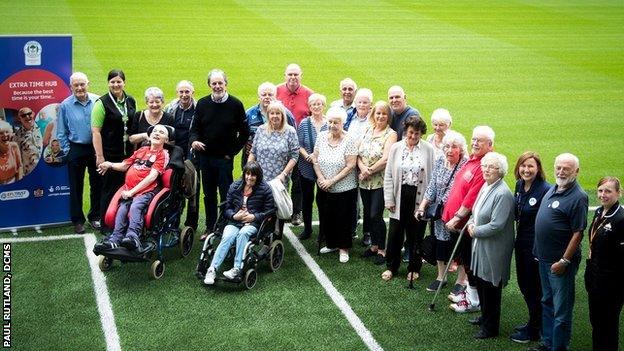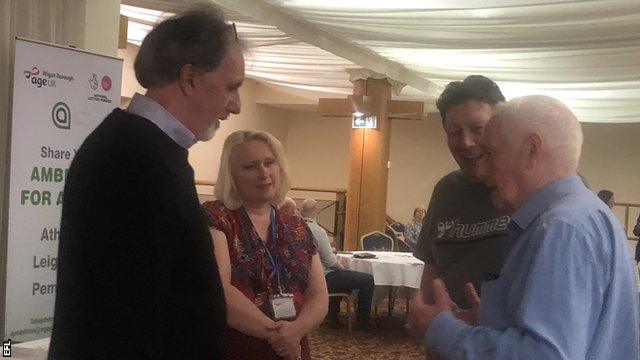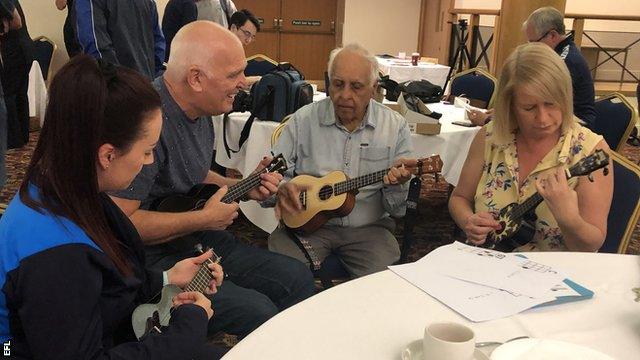Loneliness Awareness Week: How EFL clubs are bringing people together
- Published

Former Liverpool defender and BBC Sport pundit Mark Lawrenson met participants of Wigan Athletic's Extra Time Hub at Tuesday's launch event
A cup of tea and a chat can be a lifeline to some in society who feel isolated and alone.
As loneliness can grow stronger as we get older, 12 English Football League clubs are helping to bring together retired and semi-retired people in their communities.
With Loneliness Awareness Week (17-21 June) taking place, BBC Sport went to see how two of those clubs are working to combat it in older people.
'Lots of people wish they had a friend'
The initiative is designed to engage people over 55 and help them to combat being lonely and inactivity through sporting and non-sporting activities.
Sessions involve multiple activities and can take the form of indoor sports, craftwork, quizzes or even just a chat over a cup of tea.
Richard Reading attends Wigan Athletic's Extra Time Hub, along with his wife Ed, and coaches table tennis to other participants.
"There's so much that can be done by the sporting organisations and football in particular has more resources than some of the others," Reading told BBC Sport.
"Loneliness is huge for those of us on our own. I'm lucky as I have a loving wife but we know there are lot of people out there wishing they had a friend and something to do."
Studies show, external 42% of over-55s are inactive while the EFL Trust, who run the scheme, say their own research has found many people would like the opportunity to meet peers to feel less isolated.
Reading added: "I've learned that we need to do more to get the older half of society out and about doing things, not just wishing they could do them.
"If they come here, they've got the facilities to do umpteen things. Once I did table tennis, badminton, short cricket, short tennis and netball all in one afternoon."
A 'win-win' for all involved

Mark Lawrenson (left) is an ambassador for the EFL Trust's Extra Time Hub project
Former Liverpool and Republic of Ireland defender and BBC Sport pundit Mark Lawrenson is an ambassador for the project and believes the effects of the scheme can reach further than just its participants.
"There's hardly a person born who doesn't have problems. People can be lonely, suffer from depression, they might be overweight or have no friends," Lawrenson told BBC Sport.
"Once you get likeminded people together, you've got people who don't know anyone and all of a sudden they become mates.
"If they're going to be sporty, they could lose weight or avoid the threat of diabetes. If they're healthier, they don't have to go to the doctors or the hospital as much so they don't have to be another burden on the National Health Service, so I think it's win-win."
Making friends can get harder as time goes on and Lawrenson says initiatives such as this can help people's mental wellbeing as well as their physical health.
He added: "Quite a few of the people who've been here have all of a sudden got new mates. Isn't that what it's all about?
"The other thing is having something to look forward to. There's nothing worse than not doing anything all week and nobody comes to see you.
"No wonder people get depressed."
EFL clubs with Extra Time Hubs
Bolton Wanderers
Burton Albion
Charlton Athletic
Coventry City
Crawley Town
Derby County
Lincoln City
Northampton Town
Plymouth Argyle
Shrewsbury Town
Sunderland
Wigan Athletic
Improving members' mental health

Tony Grimwood (second left) teaches members how to play the ukulele at Wigan Athletic's Extra Time Hub
Despite their off-field issues, Bolton Wanderers have successfully run the scheme after being chosen as one of the original clubs.
"When people retire it is common that they stay at home and don't interact as much as they would if they were in work," Carl Halliwell, activator of Bolton Wanderers' Extra Time Hub told BBC Sport.
"We want to target those people and invite them into the stadium. They don't have to be Bolton Wanderers fans, it can be anybody within the borough of Bolton, and they can come in and meet new friends and, if possible, become more active."
The hubs are part of a scheme run by the EFL Trust and funded by Sport England, with Bolton's group growing to 30 members in its first two months.
"It's helped our attendees' mental health and the people who have attended have said they would normally stay at home and sit and watch the television and not interact with anybody," Halliwell added.
"To come in once a week with friends and speak to people has been massive. The feedback has been really good."
Tony Grimwood, another member of Wigan Athletic's Extra Time Hub, attends with his wife Jo. The couple are one of the scheme's success stories and decided to join the group soon after its inception as they wanted to make friends after moving back to Britain from Cyprus.
"Out of this, we're playing badminton on Thursdays which we couldn't do before, Jo plays netball on Mondays which she didn't do before and it's only through being here that we've done this," Grimwood told BBC Sport.
"We've now joined a badminton session just through being here and finding that we enjoy it.
"We've thrown ourselves in at the deep end in more than one scheme but this one is the only one we've stuck to."
If you are affected by any of the issues discussed in this article, please contact BBC Action Line here.